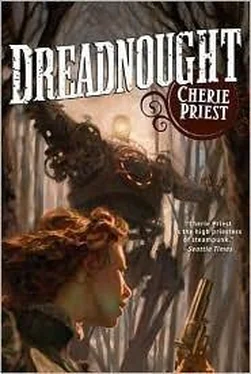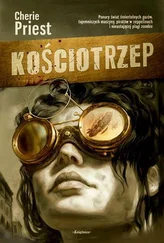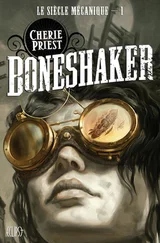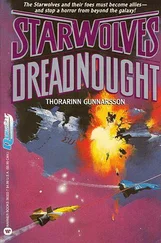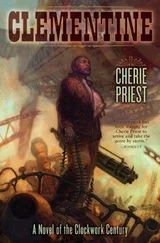Cherie Priest - Dreadnought
Здесь есть возможность читать онлайн «Cherie Priest - Dreadnought» весь текст электронной книги совершенно бесплатно (целиком полную версию без сокращений). В некоторых случаях можно слушать аудио, скачать через торрент в формате fb2 и присутствует краткое содержание. Год выпуска: 2010, ISBN: 2010, Жанр: Фантастика и фэнтези, на английском языке. Описание произведения, (предисловие) а так же отзывы посетителей доступны на портале библиотеки ЛибКат.
- Название:Dreadnought
- Автор:
- Жанр:
- Год:2010
- ISBN:978-0-7653-2578-5
- Рейтинг книги:3 / 5. Голосов: 1
-
Избранное:Добавить в избранное
- Отзывы:
-
Ваша оценка:
- 60
- 1
- 2
- 3
- 4
- 5
Dreadnought: краткое содержание, описание и аннотация
Предлагаем к чтению аннотацию, описание, краткое содержание или предисловие (зависит от того, что написал сам автор книги «Dreadnought»). Если вы не нашли необходимую информацию о книге — напишите в комментариях, мы постараемся отыскать её.
Dreadnought — читать онлайн бесплатно полную книгу (весь текст) целиком
Ниже представлен текст книги, разбитый по страницам. Система сохранения места последней прочитанной страницы, позволяет с удобством читать онлайн бесплатно книгу «Dreadnought», без необходимости каждый раз заново искать на чём Вы остановились. Поставьте закладку, и сможете в любой момент перейти на страницу, на которой закончили чтение.
Интервал:
Закладка:
She brightened. “That’s wonderful! Yes sir. That’s exactly what I’m looking for.”
“But there will be many stops along the way,” he cautioned as if this were some great surprise. “And the atmosphere might . . . prove . . .” He hunted for a word. “Unsympathetic.”
“What’s that supposed to mean?”
“This is a place of contradictions. The train heading west is a Union train by origin, and most of its passengers and crew are likewise allied in sentiment-though you can be absolutely confident, this is a civilian operation and in no way tied to the war effort at all. Not exactly.”
“Well, which is it? Not at all, or not exactly?”
He flipped his hands up as if to say some of each, and explained. “One of the last cars is transporting dead soldiers back to their homes of origin in Missouri, Kansas, Nebraska, Wyoming, and the like. As far as I know, and as far as I can tell, that’s its sole official business, and they’re taking passengers along the route as a matter of convenience, and to offset the cost, of course.” He shrugged. “Money is money, and theirs is as good as ours. Suffice it to say, they have a refrigerated car full of valued cargo-the human cargo of slain veterans. I’m given to suspect that perhaps it holds a war hero or two, or maybe even General McDowell, whose widow and family have moved out to California. Though the caskets were sealed and unmarked, except by serial numbers, so I’m afraid I can neither confirm nor deny those suspicions.” But he smiled broadly, pleased to have guessed at a secret.
“Pretty much what you’re telling me is that the fastest, easiest-and you haven’t added cheapest, but I’ll trust you wouldn’t bring it up if it were unaffordable-way I can get myself West is to keep my head down and ride a Union wagon?”
“That’s the sum of it-yes. It’ll get you there, sure enough. Probably faster and safer than just about anything else we’ve got headed that way for the next month, truth be told.”
“And why’s that?” she asked.
He hemmed and hawed again, only momentarily. “There’s a bit of a military presence on board. The engine itself is of military vintage, and only the passenger cars are a civilian contribution.” His tone lifted into something more optimistic. “Which means that you can expect virtually no trouble at all from the Indians along the way, much less the pirates and highwaymen who trouble trains these days. It’ll be quite secure.” He stopped, and started again. “And anyway, what of it, if anyone somehow learns that you’re from Virginia? This is a civilian task, and a civilian train.”
Mercy wasn’t sure whom he was trying to convince. “You don’t have to sell me on it, Mr. Foote. My trip is likewise unrelated to the war effort. So I believe I’d like to buy a ticket,” she said firmly. “As long as the ride is safe and quiet, I’ll count my lucky stars that my timing worked out so good.”
“As you like, Mrs. Lynch,” he said, and he rose from his seat.
She let him make the arrangements, and finally, after she’d handed over almost the very last of her money, he gave her an envelope stuffed with papers, including her boarding pass and itinerary.
“The train’ll be boarding down at the end, at gate thirteen.” He pointed.
“Down where all those folks are stomping around, making a crowd?”
“That’s it. Now have a good day, Mrs. Lynch-and a safe trip as well.”
“Thank you, Mr. Foote.”
She stared out the window, down at the thirteenth platform. There wasn’t much to see there except for a dense and curious crowd, for the columns between her and the engine blocked the bulk of the view. Even through the obstacles, she could see that the engine was large and dark, as engines went, and an old warning thrummed in her head. Suddenly she knew . . . illogically, and against all sane rejection of undue coincidence . . . that once she got up closer, she’d recognize the machine, by reputation if not by sight.
She drifted dreamlike toward the crowd and then back to the edge of the platform, where the people moved more quickly and with less density. Following the thinner stream, she shifted her satchel to hug it more closely against her belly.
Blue uniformed men with guns pocked the scene, mostly staying close to the engine, to the spot that felt safest to them in this uncertain state of divided loyalties.
The engine’s stack rose into view first, between the platform beams that held the shelter aloft. It could’ve been any freight engine’s stack, dark and matte as wool made for mourning. The lamp-which also came into view as she drew nearer-could have been any lamp, rounded and elongated slightly, with a stiff wire mesh to protect the glass.
But then the pilot piece, the cowcatcher, eased into view as two men stepped apart. No longer could it be any engine, from any rail yard or nation. Devilishly long and sharp, the fluted crimson cage drew down to a knife’s bleeding, triangular edge, made to stab along a track and perform other vicious duties-that much was apparent from the rows of narrow cannon mounted up and down the slope against the engine’s face. In front of the pilot grille, even the rail guards that covered and protected the front wheels were spiked with low scoops and sharp points, just in case something small and deadly should be flung upon the tracks that the pilot might otherwise miss. All the way up the chassis more guns were nestled, as well as elaborate loading systems to feed ammunition to the devices in a Gatling style. And as she approached yet closer, squeezing her way through the crowd to get a look for herself, Mercy noted that the boiler was double-, or maybe even triple-plated, riddled with rows of bolts and rivets.
A water crane swung down low to hang over the engine. Soldiers ordered and shoved the onlookers back, demanding room for the crew and station workers to do their jobs; and soon the valves had been turned and the flow was under way. As the engine took on water for the trip ahead, spilling down the pipes into the still-warm tanks, the metal creaked and settled with a moan.
The gargantuan machine was nearly twice as large as the ordinary engine huddling two tracks over-not twice as wide, but longer, and somewhat taller, and appeared thicker and meaner in every way.
A man beside Mercy-some random gawker in the pressing crowd-turned to her as if he knew her and said, “My God, it’s enormous! It’ll barely fit under the station awnings!”
And behind her came a different voice, slightly familiar and heavily accented. “But it did fit,” said the speaker with great conciseness. The nurse turned around and saw the most recent Texian to come aboard the Providence -the Ranger Horatio Korman. He added, “You can bet they were careful about that,” and he tipped his Stetson to Mercy. “Mrs. Lynch.” He nodded.
“Hello,” she said, and moved aside, allowing him to scoot one booted foot closer to the tracks, almost to stand at her side. Together they stared ahead, unable to take their gazes away from it.
Along the engine’s side, Mercy could see a few of the letters in its name, though she could barely parse the sharp silver lettering with cruel edges and prickling corners that closely matched the gleaming silver trim on the machine’s towering capstack.
The ranger said it first. “ Dreadnought . God Almighty, I hoped I’d never see it for myself. But here I am,” he said with a sniff. He looked down at Mercy, and at her hand, which held the envelope with all her important papers and tickets. Then his gaze returned to the train. “And I’m going to ride whatever she’s pulling. You, too, ma’am?”
“Me, too.” She nodded.
“You nervous?” he asked.
Читать дальшеИнтервал:
Закладка:
Похожие книги на «Dreadnought»
Представляем Вашему вниманию похожие книги на «Dreadnought» списком для выбора. Мы отобрали схожую по названию и смыслу литературу в надежде предоставить читателям больше вариантов отыскать новые, интересные, ещё непрочитанные произведения.
Обсуждение, отзывы о книге «Dreadnought» и просто собственные мнения читателей. Оставьте ваши комментарии, напишите, что Вы думаете о произведении, его смысле или главных героях. Укажите что конкретно понравилось, а что нет, и почему Вы так считаете.
